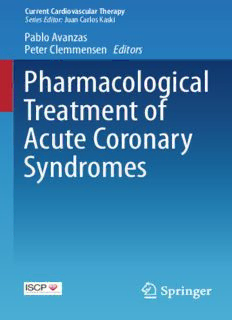
Pharmacological treatment of acute coronary syndromes PDF
Preview Pharmacological treatment of acute coronary syndromes
Current Cardiovascular Therapy Series Editor: Juan Carlos Kaski Pablo Avanzas Peter Clemmensen Editors Pharmacological Treatment of Acute Coronary Syndromes Current Cardiovascular Therapy Pablo Avanzas Peter Clemmensen (cid:129) Editors Juan Carlos Kaski Series Editor Pharmacological Treatment of Acute Coronary Syndromes Editors Pablo Avanzas, MD, PhD, FESC Peter Clemmensen, MD, PhD, Department of Cardiology FESC Hospital Universitario Department of Cardiology Central de Asturias The Heart Center Oviedo Rigshospitalet Spain University Hospital of Copenhagen Copenhagen Denmark ISBN 978-1-4471-5423-5 ISBN 978-1-4471-5424-2 (eBook) DOI 10.1007/978-1-4471-5424-2 Springer London Heidelberg New York Dordrecht Library of Congress Control Number: 2013950913 © Springer-Verlag London 2014 This work is subject to copyright. All rights are reserved by the Publisher, whether the whole or part of the material is concerned, specifi cally the rights of translation, reprinting, reuse of illustrations, recitation, broadcasting, reproduc- tion on microfi lms or in any other physical way, and transmission or information storage and retrieval, electronic adaptation, computer software, or by similar or dissimilar methodology now known or hereafter developed. Exempted from this legal reservation are brief excerpts in connection with reviews or scholarly analysis or material supplied specifi cally for the purpose of being entered and executed on a computer system, for exclusive use by the purchaser of the work. Duplication of this publication or parts thereof is permitted only under the provi- sions of the Copyright Law of the Publisher's location, in its current version, and permission for use must always be obtained from Springer. Permissions for use may be obtained through RightsLink at the Copyright Clearance Center. Violations are liable to prosecution under the respective Copyright Law. The use of general descriptive names, registered names, trademarks, service marks, etc. in this publication does not imply, even in the absence of a specifi c statement, that such names are exempt from the relevant protective laws and regulations and therefore free for general use. While the advice and information in this book are believed to be true and accu- rate at the date of publication, neither the authors nor the editors nor the pub- lisher can accept any legal responsibility for any errors or omissions that may be made. The publisher makes no warranty, express or implied, with respect to the material contained herein. Printed on acid-free paper Springer is part of Springer Science+Business Media (www.springer.com) This book is dedicated to Prof. Juan Carlos Kaski, President of ISCP Series Preface Cardiovascular pharmacotherapy is of fundamental impor- tance for the successful management of patients with cardio- vascular diseases. Appropriate therapeutic decisions require a proper understanding of the disease and a thorough knowl- edge of the pharmacological agents available for clinical use. The issue is complicated by the existence of large numbers of agents with subtle differences in their mode of action and efficacy and the existence of national and international guidelines, which sometimes fail to deliver a clear-cut mes- sage. Aggressive marketing techniques from pharma indus- try; financial issues at local, regional, or national levels; and time constraints make it difficult for the practitioner to – at times – be absolutely certain as to whether drug selection is absolutely appropriate. The International Society of Cardiovascular Pharmacotherapy (ISCP) aims at supporting evidence-based, rational pharmacotherapy worldwide. This book series represents one of its vital educational tools. The books in this series aim at contributing independent, bal- anced, and sound information to help the busy practitioner to identify the appropriate pharmacological tools and to deliver rational therapies. Topics in the series include all major car- diovascular scenarios, and the books are edited and authored by experts in their fields. The books are intended for a wide range of healthcare professionals and particularly for younger consultants and physicians in training. All aspects of pharma- cotherapy are tackled in the series in a concise and practical fashion. The books in this series provide a unique set of guidelines and examples that will prove valuable for patient management. They clearly articulate many of the dilemmas vii viii Series Preface clinicians face when working to deliver sound therapies to their patients. The series will most certainly be a useful refer- ence for those seeking to deliver evidence-based, practical, and successful cardiovascular pharmacotherapy. Juan Carlos Kaski, DSc, DM (Hons), MD, FRCP, FESC, FACC, FAHA ISCP Current Cardiovascular Therapy Series Prefa ce Acute coronary syndromes (ACS) require rapid intervention with pharmacologic therapies to treat and prevent coronary thromboembolism, and is essential to prepare the patient for revascularization procedures, especially percutaneous coro- nary intervention. The aims of treatment are to preserve patency of the coronary artery, augment blood flow through stenotic lesions, and reduce myocardial oxygen demand. Conventional treatment includes anti-ischemic, antiplatelet and anticoagulant therapy. All patients should receive anti- platelet agents, and patients with evidence of ongoing isch- emia should receive aggressive medical intervention until signs of ischemia, as determined by symptoms and ECG, resolve. After a decade of relatively few advances in anti- thrombotic treatment, the clinical availability of potent new inhibitors of P2Y platelet receptors has changed the ACS 12 treatment paradigm. The most recent AMI – STEMI and NSTE-ACS guidelines of the European Society of Cardiology (ESC) have recommended ticagrelor and prasugrel in prefer- ence to clopidogrel for ACS patients, but globally clopidogrel is expected to remain a dominant therapy for the years to come. Furthermore, a group of novel oral anticoagulant and antiplatelet agents are promising for the acute management and secondary prevention in ACS. Triple therapy, while not initiated in the acute setting, may impact on future surgical and medical emergencies, and their management including bleeding complication should be known to health profession- als across a wide spectrum of specialties. The ESC guidelines recommendations also differ for each of the antiplatelet and anticoagulant agent in terms of patient selection, pretreatment ix
Description: